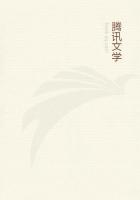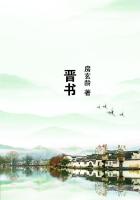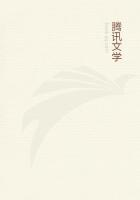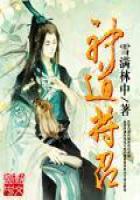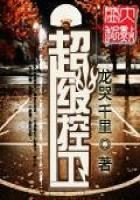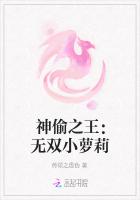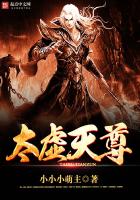Vholes, putting out his long black sleeve, to check the ringing of the bell, 'not any.'" Mr. and Mrs. Tope "are daintily sticking sprigs of holly into the carvings and sconces of the cathedral stalls, as if they were sticking them into the button-holes of the Dean & Chapter." The two young Eurasians, brother and sister, "had a certain air upon them of hunter and huntress; yet withal a certain air of being the objects of the chase rather than the followers."This phrase lacks elegance--and Dickens is not often inelegant, as those who do not read him may be surprised to learn--but the impression is admirable; so is that which follows: "An indefinable kind of pause coming and going on their whole expression, both of face and form." Here is pure, mere impression again: "Miss Murdstone, who was busy at her writing-desk, gave me her cold finger-nails." Lady Tippins's hand is "rich in knuckles." And here is vision with great dignity: "All beyond his figure was a vast dark curtain, in solemn movement towards one quarter of the heavens."With that singleness of sight--and his whole body was full of the light of it--he had also the single hearing; the scene is in the Court of Chancery on a London November day: "Leaving this address ringing in the rafters of the roof, the very little counsel drops, and the fog knows him no more." "Mr. Vholes emerged into the silence he could scarcely be said to have broken, so stifled was his tone." "Within the grill-gate of the chancel, up the steps surmounted loomingly by the fast-darkening organ, white robes could be dimly seen, and one feeble voice, rising and falling in a cracked monotonous mutter, could at intervals be faintly heard . . . until the organ and the choir burst forth and drowned it in a sea of music. Then the sea fell, and the dying voice made another feeble effort; and then the sea rose high and beat its life out, and lashed the roof, and surged among the arches, and pierced the heights of the great tower; and then the sea was dry and all was still. And this is how a listener overheard men talking in the cathedral hollows: "The word 'confidence,' shattered by the echoes, but still capable of being pieced together, is uttered."Wit, humour, derision--to each of these words we assign by custom a part in the comedy of literature; and (again) those who do not read Dickens--perhaps even those who read him a little--may acclaim him as a humourist and not know him as a wit. But that writer is a wit, whatever his humour, who tells us of a member of the Tite Barnacle family who had held a sinecure office against all protest, that "he died with his drawn salary in his hand." But let it be granted that Dickens the humourist is foremost and most precious. For we might well spare the phrase of wit just quoted rather than the one describing Traddles (whose hair stood up), as one who looked "as though he had seen a cheerful ghost." Or rather than this:-He was so wooden a man that he seemed to have taken his wooden leg naturally, and rather suggested to the fanciful observer that he might be expected--if his development received no untimely check--to be completely set up with a pair of wooden legs in about six months.
Or rather than the incident of the butcher and the beef-steak. He gently presses it, in a cabbage leaf, into Tom Pinch's pocket.
"'For meat,' he said with some emotion, 'must be humoured, not drove.'"A generation, between his own and the present, thought Dickens to be vulgar; if the cause of that judgement was that he wrote about people in shops, the cause is discredited now that shops are the scenes of the novelist's research. "High life" and most wretched life have now given place to the little shop and its parlour, during a year or two. But Dr. Brown, the author of Rab and His Friends, thought that Dickens committed vulgarities in his diction. "A good man was Robin" is right enough; but "He was a good man, was Robin"is not so well, and we must own that it is Dickensian; but assuredly Dickens writes such phrases as it were dramatically, playing the cockney. I know of but two words that Dickens habitually misuses, and Charles Lamb misuses one of them precisely in Dickens's manner;it is not worth while to quote them. But for these his English is admirable; he chooses what is good and knows what is not. A little representative collection of the bad or foolish English of his day might be made by gathering up what Dickens forbore and what he derided; for instance, Mr. Micawber's portly phrase, "gratifying emotions of no common description," and Littimer's report that "the young woman was partial to the sea." This was the polite language of that time, as we conclude when we find it to be the language that Charlotte Bronte shook off; but before she shook it off she used it.
Dickens, too, had something to throw off; in his earlier books there is an inflation--rounded words fill the inappropriate mouth of Bill Sikes himself--but he discarded them with a splendid laugh. They are charged upon Mr. Micawber in his own character as author. See him as he sits by to hear Captain Hopkins read the petition in the debtors' prison "from His Most Gracious Majesty's unfortunate subjects." Mr. Micawber listened, we read, "with a little of an author's vanity, contemplating (not severely) the spikes upon the opposite wall." It should be remembered that when Dickens shook himself free of everything that hampered his genius he was not so much beloved or so much applauded as when he gave to his cordial readers matter for facile sentiment and for humour of the second order. His public were eager to be moved and to laugh, and he gave them Little Nell and Sam Weller; he loved to please them, and it is evident that he pleased himself also. Mr. Micawber, Mr. Pecksniff, Mrs. Nickleby, Mrs. Chick, Mrs. Pipchin, Mr. Augustus Moddle, Mrs.
Jellyby, Mrs. Plornish, are not so famous as Sam Weller and Little Nell, nor is Traddles, whose hair looked as though he had seen a cheerful ghost.

